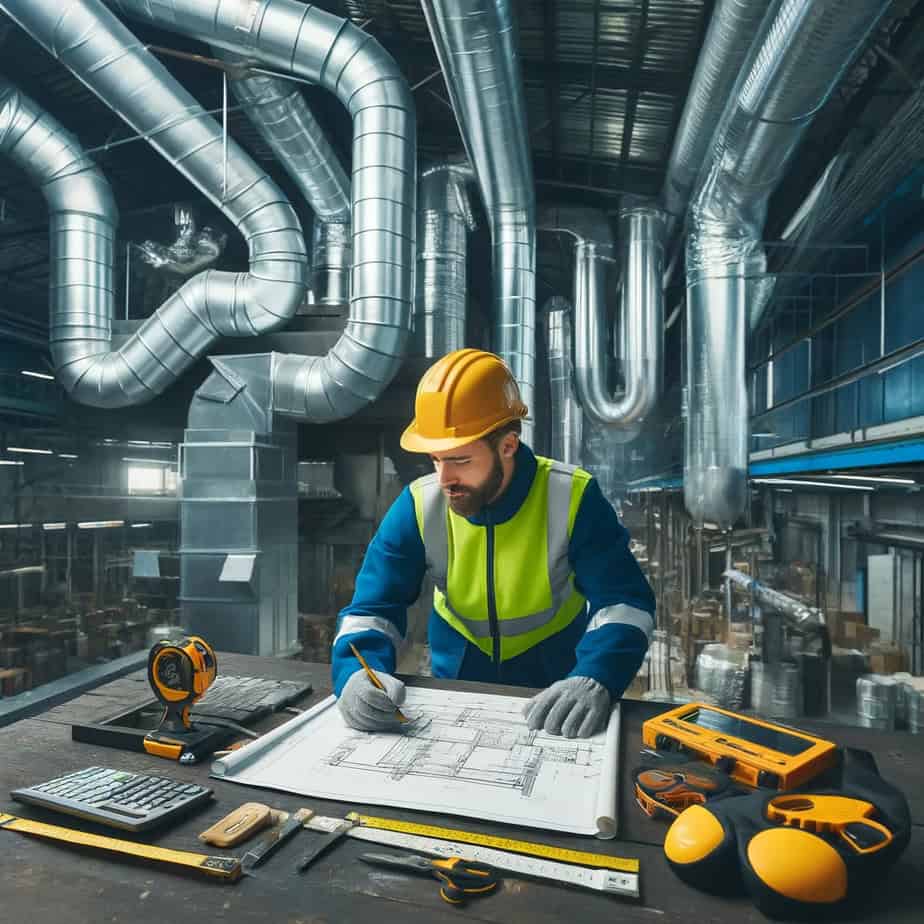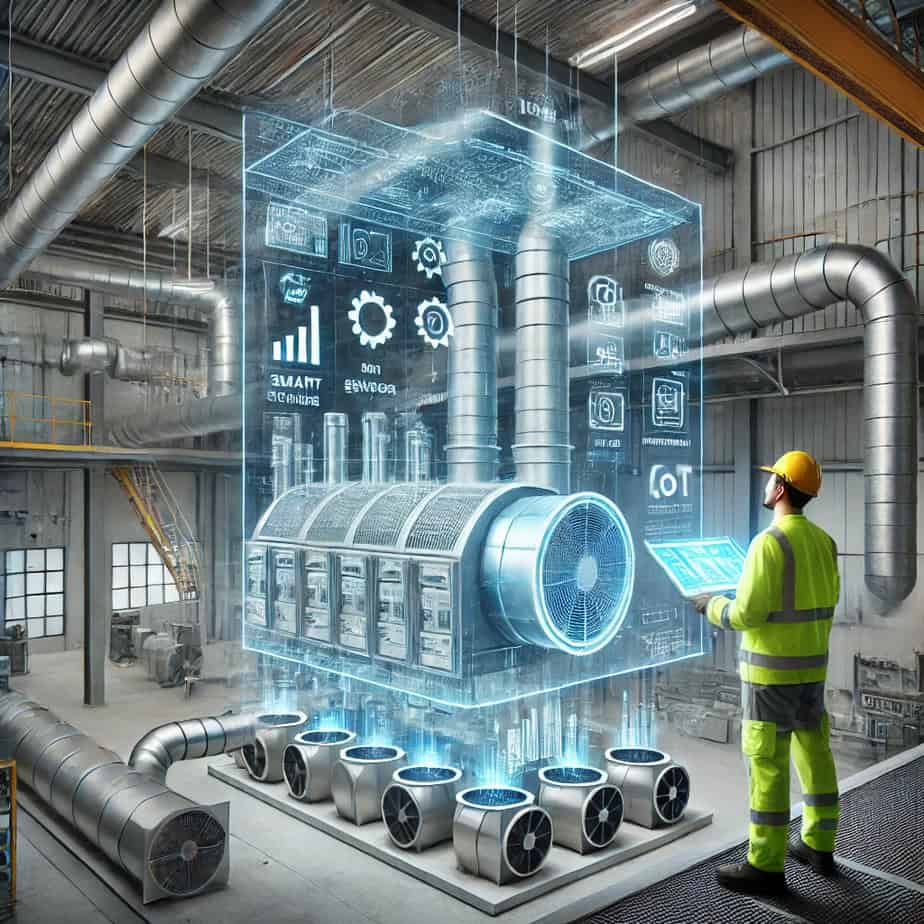Ensure you have the right people on-site in mechanical and electrical (M&E) projects. Whether you are managing HVAC installations for commercial development, implementing complex ventilation systems, or handling industrial projects, the role of skilled ductwork engineers must be balanced. Hiring qualified ductwork engineers is critical for delivering projects on time, maintaining compliance with UK regulations, and achieving the highest standards of artistry.
The demand for experienced ductwork engineers has grown substantially in recent years, driven by advancements in energy efficiency requirements, innovative technology integration, and the need for sustainable building practices. With infrastructure projects expanding across the UK, the construction and M&E industries are pressured to meet timelines and maintain quality and safety. Skilled professionals are the backbone of these projects, ensuring that systems are functional, energy-efficient, and compliant with all regulations. The right hires can significantly reduce operational costs while improving performance, making them indispensable to project success.
However, sourcing the right professionals can often be challenging. This blog post will guide you through the process of finding and hiring skilled ductwork engineers, offer insights into the industry’s state, and explain how partnering with a recruitment specialist like Robert Hurst Group Ltd. can simplify the task.

Why Qualified Ductwork Engineers Are Essential
Finding skilled professionals is not just about filling roles—it’s about ensuring project success. Qualified ductwork engineers bring expertise directly impacting project efficiency, safety, and compliance. Businesses risk costly errors and regulatory penalties without precision and understanding of ventilation systems.
Ductwork engineers are pivotal in HVAC (Heating, Ventilation, and Air Conditioning) systems. Their expertise ensures that ventilation systems are designed and installed efficiently while meeting regulatory standards such as Building Regulations Part F in the UK, which sets guidelines for ventilation in residential and non-residential buildings.
Here are key reasons why hiring qualified ductwork engineers is essential:
Accurate Ductwork Installation
Skilled ductwork engineers ensure that ducting systems are installed precisely, preventing air leaks, inefficiencies, and energy loss. For example, poor installation can result in up to 30% energy loss through duct leakage, as the Chartered Institution of Building Services Engineers (CIBSE) reported.
Ensuring Energy Efficiency
Well-designed and installed ductwork systems directly impact energy efficiency. A qualified engineer can optimise the layout of ventilation systems to minimise pressure losses and improve airflow, reducing operational costs. This is particularly important as businesses aim to comply with energy efficiency targets set under UK Net Zero initiatives.
Meeting Health and Safety Compliance
Ductwork systems in commercial and industrial buildings must comply with strict fire safety and air quality standards. Skilled ductwork engineers are trained to meet regulations such as BS 9999 for building fire safety and the Health and Safety at Work Act.
Reducing Long-Term Maintenance Costs
High-quality ductwork installation minimises the need for ongoing repairs and maintenance. Systems that qualified professionals correctly install can last significantly longer, leading to fewer disruptions and reduced costs over the building’s lifecycle.
Supporting Sustainable Building Practices
With the growing emphasis on sustainable construction, ductwork engineers play a key role in achieving energy-efficient ventilation systems. Using materials like pre-insulated ducts or modular systems can reduce waste and improve projects’ environmental footprints.
Industry Challenges in Hiring Qualified Ductwork Engineers
Recruiting ductwork engineers can be more challenging than anticipated. Industry growth, increased demand, and skill shortages have created a competitive environment for hiring the best professionals. Understanding these challenges can help businesses plan more effectively.
Increasing Skills Shortages
The UK construction and M&E sectors face significant skills shortages. A recent Construction Industry Training Board (CITB) report highlighted that 266,000 workers are needed by 2026 to meet industry demands, including roles such as ductwork engineers.
Complex Regulatory Requirements
With increasingly stringent building regulations and environmental targets, ensuring compliance requires experienced engineers who are up to date with current legislation, including the latest amendments to Building Regulations Part L for energy efficiency.
High Demand for Large Projects
The rise of large-scale infrastructure projects, such as HS2 and commercial developments across the UK, means that demand for ductwork engineers often outstrips supply, leading to longer recruitment timelines for businesses.
The Cost of Poor Hiring Decisions
According to a UK Construction Leadership Council study, hiring underqualified engineers can lead to errors, rework, and delays, increasing project costs by 20-30%.
Steps to Hire Skilled Ductwork Engineers

Hiring skilled professionals does not happen by chance—it requires planning and a clear strategy. Businesses can streamline recruitment and secure the right talent for their projects by following a structured approach.
Define Clear Project Requirements
Before initiating recruitment, outline specific project requirements such as:
- Project size and scope
- Required skills (e.g., installation, fabrication, CAD experience)
- Certifications (e.g., CSCS cards, NVQ Levels 2 and 3 in Ductwork Installation)
- Timelines and deadlines
- Work with a Specialist Recruitment Agency
Partnering with an agency like Robert Hurst Group Ltd. ensures access to pre-vetted candidates. Agencies with expertise in the M&E sector have direct connections to professionals with relevant experience, reducing recruitment time.
Verify Skills and Certifications
Key qualifications to verify include:
- NVQ Level 2 or 3 in Ductwork Installation
- CSCS Card (Construction Skills Certification Scheme)
- Health and safety certifications, such as SMSTS (Site Management Safety Training Scheme)
- Conduct Technical Assessments
Assess candidates for:
- Ability to interpret technical drawings
- Knowledge of materials like galvanised steel, aluminium, and pre-insulated ducts
- Experience with modern HVAC tools and equipment
- Check References and Portfolios
Request case studies or portfolios of past projects. References from previous employers can offer valuable insights into reliability, skills, and professionalism.
Ensure Compliance Knowledge
Ductwork engineers must know UK-specific building regulations, fire safety standards, and energy efficiency guidelines.
Common Mistakes to Avoid When Hiring Ductwork Engineers
Avoiding common hiring mistakes can save time, resources, and project delays. Recognising these errors allows businesses to refine recruitment practices and secure better results.
Overlooking Certifications
Hiring engineers without proper certifications can lead to non-compliance with regulations. Always verify NVQs, CSCS cards, and health and safety credentials.
Rushing the Recruitment Process
While tight project timelines can pressure businesses to hire quickly, rushing the process increases the risk of mistakes. Take the time to vet candidates thoroughly.
Ignoring Experience with Specific Projects
Experience matters. Engineers who have worked on similar commercial, residential, or industrial projects are more likely to deliver efficient and compliant solutions.
Failing to Plan for Long-Term Needs
Hiring for immediate needs without considering long-term project goals can create workforce gaps later. Partner with an agency to plan for short—and long-term staffing requirements.
Case Study: Successful Ductwork Recruitment
Case studies provide real-world examples of how strategic recruitment can transform a project. By understanding these successes, businesses can apply similar practices to their hiring processes.
Client: Major London Commercial Development
A leading UK developer needed a team of qualified ductwork engineers for a new 50-storey commercial building in central London. To streamline recruitment, they partnered with Robert Hurst Group Ltd.
Challenges:
- Tight project timelines
- High compliance standards for fire safety and energy efficiency
Solutions:
- Robert Hurst Group provided a team of 10 pre-vetted ductwork engineers with relevant certifications (CSCS and NVQ Level 3).
- Engineers were placed on-site within two weeks.
Results:
- The project was completed three weeks ahead of schedule.
- Installation passed regulatory inspections without issues.
- The client reported a 25% improvement in energy efficiency over standard installations.
The Future of Ductwork Engineering

The HVAC and ductwork industry is evolving rapidly. Businesses that understand future trends can position themselves ahead of competitors by securing talent with the right expertise.
Growing Focus on Net Zero Goals
The UK’s commitment to achieving Net Zero by 2050 will drive demand for highly efficient ductwork systems, placing skilled engineers at the forefront of sustainable construction.
Advancements in Prefabrication
Prefabricated ductwork solutions are gaining popularity because they can reduce on-site installation times, improve quality, and minimise waste.
Smart Technology Integration
Smart sensors and IoT in HVAC systems are revolutionising ductwork design. Engineers with experience in modern technology will be in high demand.
Upskilling and Training
Ongoing investment in training and apprenticeships will be critical to addressing skills shortages and preparing engineers for emerging technologies.
Conclusion
Hiring qualified ductwork engineers is essential for delivering successful M&E projects. Skilled professionals ensure precision installation, regulatory compliance, and long-term system efficiency, which is critical for meeting client expectations and reducing costs.
By partnering with Robert Hurst Group Ltd., you gain access to pre-vetted, experienced ductwork engineers who can meet your project’s demands. From commercial skyscrapers to industrial ventilation systems, we provide tailored recruitment solutions that ensure project success.
Are you looking for skilled ductwork engineers for your next project?
Contact Robert Hurst Group Ltd. today to learn how we can help you hire the right professionals quickly and efficiently.
- Website: https://roberthurstgroup.co.uk
- Phone: 01256 817878
- Email: info@roberthurstgroup.co.uk
